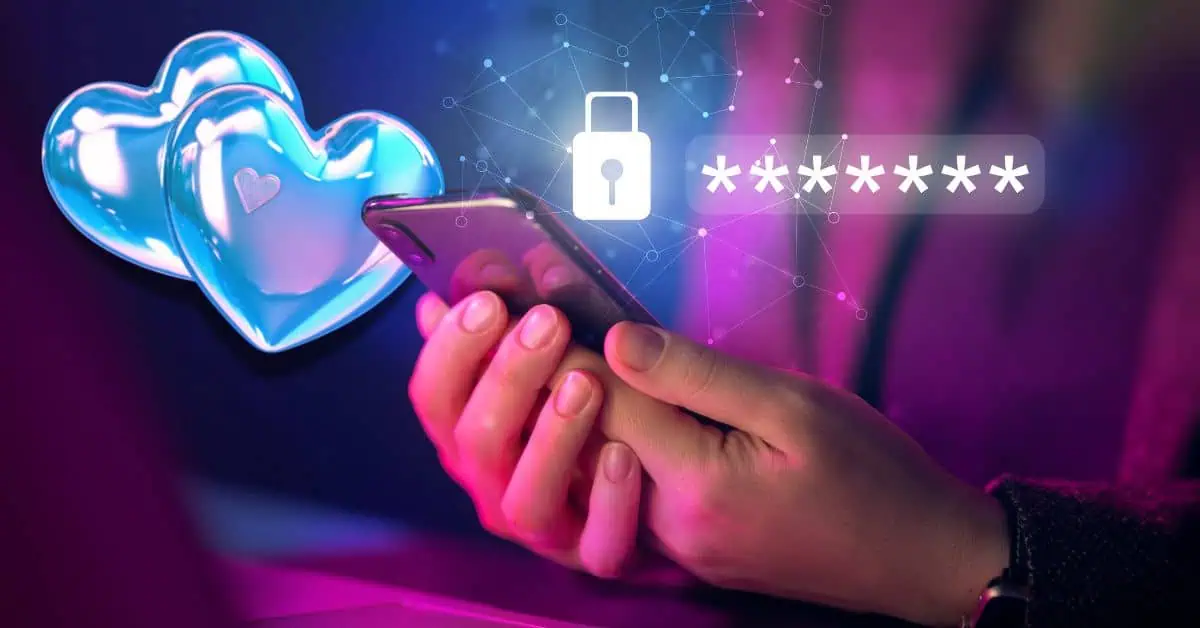As you know, online dating is the most popular way to meet new people—every day, millions of people are searching for love and companionship on hundreds of dating apps and platforms. But with this rise in popularity comes a startling increase in cybersecurity risks. In fact, a recent study found that one in 10 online dating profiles is fake and is created solely with the malicious intent to steal personal info. Yikes!
Given the potential dangers, it’s more important than ever to have a solid grasp of cybersecurity in the online dating world—and how to protect yourself. Keeping your sensitive personal info secure should be a priority, numero uno! Looking for love is a close second, but in order to do that safely, you need to know the facts.
That’s what we’re here to do—give you practical and easy tips for upping your cybersecurity while using dating apps! From creating super strong passwords to spotting those red flags and everything in between, knowing how to keep your info locked up tight will safeguard your personal deets so you can focus on finding that perfect match.
If you want a TL;DR version, you can see a full summary of this article below.
Understanding the Risks
Obviously, online dating is a convenient way to meet new people and potentially find romantic partners—that’s why so many people use them! But just because the majority of people on dating platforms are there for the right reasons doesn’t mean there aren’t bad apples. That’s why users have to be cognizant of the cybersecurity risks so they can protect themselves from bad actors, aka cybercriminals. What are the most common cybersecurity threats in online dating? Read on to find out, and we’ll explain the potential consequences of cybersecurity breaches.

Common Cybersecurity Threats in Online Dating
- Phishing Scams: Phishing scams are deceptive attempts by cybercriminals to obtain sensitive information by pretending to be trustworthy entities. In the context of online dating, scammers often send fake emails or messages that appear to come from legit dating apps. These messages might ask users to verify their accounts or provide personal details like passwords or credit card information. Phishing scams can be highly convincing and challenging to detect.
- Romance Scams: Romance scams involve fraudsters creating fake profiles to establish romantic relationships with victims. Once they gain the victim’s trust, they fabricate urgent situations requiring financial help, such as medical emergencies or travel expenses. Victims often end up sending large amounts of money to the scammers, who then disappear without a trace. In 2022, Americans reported losing over $1.3 billion to romance scams.
- Malware: Cybercriminals can use dating platforms to distribute malware through malicious links or message attachments. Malware can infect a user’s device, allowing attackers to steal personal information, monitor activities, or even take control of the device. This can lead to further exploitation, including financial theft and data breaches.
- Identity Theft: Personal info that is shared on dating profiles, such as names, addresses, and birthdates, can be harvested by cybercriminals for identity theft. Stolen identities can be used to open bank accounts, apply for credit cards, or take part in other fraudulent activities in the victim’s name. This type of cybercrime can have long-lasting financial and legal repercussions.
- Data Breaches: Dating platforms store massive amounts of personal information, making them really attractive targets for hackers. Data breaches can expose sensitive user information, including private messages, photos, and payment details. Such breaches can lead to further attacks, like phishing or identity theft, and compromise the privacy and security of affected individuals.

Impact of Cybersecurity Breaches
Cybersecurity breaches in online dating can have severe and far-reaching consequences, affecting victims financially, emotionally, and psychologically.
- Financial Loss: One of the most immediate and tangible impacts of cybersecurity breaches is financial loss. Victims of phishing and romance scams can lose substantial amounts of money, often because they have been manipulated into making payments or providing financial details. Recovering these funds is typically difficult, as cybercriminals use sophisticated methods to cover their tracks.
- Privacy Invasion: Cybersecurity breaches can lead to significant privacy invasions. When personal information is exposed through data breaches or identity theft, it can be used by cybercriminals for malicious purposes. This can include unauthorized access to personal accounts, misuse of private photos and messages, and further phishing attempts. The loss of privacy can be deeply unsettling and damaging to a person’s sense of security.
- Emotional Distress: The emotional impact of falling victim to cyber scams can be quite profound. Victims of romance scams, in particular, often experience feelings of betrayal, embarrassment, and anxiety. The psychological effects can be long-lasting, affecting a person’s trust in others and their willingness to engage in online dating in the future—if ever again. Additionally, the stress of dealing with financial loss and privacy invasion can contribute to emotional distress and mental health issues.
Setting Up a Secure Dating Profile
First up (cracks knuckles), you have to create a secure dating profile if you want to protect your personal information and minimize the risk of any cyber threats. As the number of users on dating platforms grows, so do the opportunities for cybercriminals to exploit even the smallest vulnerabilities. By following best practices for setting up your profile, you can safeguard your privacy and security. Here’s how to do it!

Choosing a Strong Password
A strong password is the basic element of online security—here are some easy tips to help you create and manage secure passwords:
- Use a Mix of Letters, Numbers, and Symbols: A strong password must include a combo of uppercase and lowercase letters, special characters, and numbers. Although pretty much impossible to memorize, this complexity makes it harder for cybercriminals to guess or crack your password through brute-force attacks. A password like “P@ssw0rd!” is much more secure than “password123.”
- Avoid Using Easily Guessable Information: Never, ever use personal info that can be easily guessed or found online, like your name, birthdate, or common phrases. Passwords like “Melinda1982” or “ILovePuppies” are way too simple and can be easily compromised. Instead, use random combos of characters and avoid using the same password for multiple accounts.
- Think About Using a Password Manager: Managing multiple strong passwords is no easy feat, but a password manager can help! These lifesavers store and encrypt your passwords, meaning you can use unique, complicated passwords for each account without having to remember them all.
Some popular password managers include:
- Bitwarden
- LastPass
- Dashlane
- NordPass
- 1Password
- RoboForm
Apple and Google smartphones have keychains for password management if you don’t want to shell out extra money for a dedicated password manager app!

Profile Information
Ok, it’s time to set up your dating profile—but how much info is too much? Yes, you want to tell other singles about yourself, but you don’t want to make yourself vulnerable to cybercriminals either! There’s a balance to be had here: sharing just enough information to attract potential matches while still protecting your privacy. Here are some best practices for sharing personal information:
What to Include and What to Avoid: Include general information about your interests, hobbies, and what you’re looking for in a partner. Do not share sensitive info like your full name, address, phone number, or where you work. This helps protect your identity and personal safety.
- Not Using Real Names, Addresses, or Other Identifying Details in Public Profiles: Using your real name, address, or other identifying details in your public profile can make it easier for cybercriminals to find and exploit you. Instead, use a nickname or your first name only. Be mindful of the photos you share as well; avoid images that reveal your location or other personal information. FYI: Photos taken in front of your home or workplace can give away your address.
- Be Careful with Social Media Links: Lots of dating platforms allow users to link their profiles to social media accounts. While this can give your profile a lil something extra and give potential matches a better idea of who you are, it also increases the risk of exposing personal information. If you do choose to link your social media accounts, review your privacy settings and limit the amount of personal information that will be visible to strangers.
- Regularly Update Your Privacy Settings: Dating platforms frequently update their privacy policies and settings. Regularly review and update your privacy settings to make sure you’re taking advantage of the latest security features. This can include restricting who can view your profile, blocking specific users, and reporting suspicious activity.
- Use the Platform’s Messaging System: Avoid moving conversations to external messaging apps or email until you feel sure about the person you’re communicating with. All dating apps have built-in messaging systems that offer a level of anonymity and security. Moving to external apps too soon can expose you to additional risks, like phishing attempts or malware.
Secure Communication Practices on Dating Apps
You’ve created a strong password, your dating profile is set up and secure, and now it’s time to meet your matches! Hold up. You aren’t thinking about taking the conversation off the app yet. Are you? You might want to rethink that! Being mindful of how you communicate with potential matches is part of being secure, and that means using in-app messaging features and not moving conversations to external platforms too soon.

In-App Messaging vs. External Communication
Using the messaging features provided by dating apps is advantageous in terms of safety and privacy for the following reasons:
- Better Security: Dating apps are designed with built-in security features to protect user information. In-app messaging often includes encryption, ensuring that your conversations remain private and secure. Moving to external platforms too soon can expose you to various security risks, including phishing and malware attacks.
- Controlled Environment: In-app messaging allows the platform to monitor interactions and detect suspicious behavior. Many dating apps have algorithms that can identify and block potential scammers, providing an additional layer of protection. This controlled environment helps maintain a safer space for users to communicate.
- Anonymity and Privacy: Keeping conversations within the app allows you to maintain a level of anonymity. You are not required to share your phone number, email address, or other personal contact information until you feel comfortable and have established trust with the other person. This can prevent unwanted intrusions and potential harassment.

Risks of Moving to External Platforms Too Soon
- Increased Vulnerability to Scams: Once you move conversations to external platforms like email, social media, or messaging apps, you lose the protective measures offered by the dating app. Scammers often try to move conversations off the platform quickly to avoid detection and gain access to more personal information.
- Exposure to Phishing and Malware: External communication platforms may not have the same level of security as dating apps. This increases the risk of encountering phishing attempts or receiving links that contain malware. These malicious activities can compromise your personal information and device security.

Avoiding Phishing Attempts
Phishing is a common tactic used by cybercriminals to steal personal information—knowing how to spot and avoid phishing attempts is part of staying safe while online dating!
Warning Signs of Phishing Attempts
- Unsolicited Messages: Be super wary of messages that come out of the blue, especially if they contain links or attachments. Phishers often send unsolicited messages that appear to be from legitimate sources, encouraging you to click on a link or download a file.
- Urgency and Pressure: Phishing messages often create a sense of urgency, pressuring you to act quickly. This could be in the form of a threat (e.g., “Your account will be suspended if you don’t update your information”) or an enticing offer (e.g., “You’ve won a prize! Click here to claim it”).
- Requests for Personal Info: Legitimate organizations will never ask for sensitive info via email or message, such as passwords or credit card details. If you get a message requesting this kind of information, it is most likely a phishing attempt.
Steps to Take if You Suspect a Phishing Attempt
- Do Not Click Links or Download Attachments: If you receive a suspicious message, avoid clicking any links or downloading attachments. These could contain malware designed to steal your information or damage your device.
- Verify the Source: If the message claims to be from a legitimate organization, contact them directly using official contact details (not those provided in the message) to verify its authenticity. This can help you suss out and confirm whether the message is real or a phishing attempt.
- Report the Attempt: Report any suspicious messages to the dating app or platform you are using. Most platforms have procedures in place to handle phishing attempts and can take action to protect other users.
- Use Security Features: Enable security features such as two-factor authentication on your accounts to add an extra layer of protection. This can help stop unauthorized access even if your login details have been compromised.
By keeping your conversations within the dating app and being vigilant about phishing attempts, you can greatly reduce your risk of falling victim to cyber scams. Always prioritize your safety and privacy, and take advantage of the security features offered by the dating platform!
Verifying Matches and Maintaining Privacy
How do you know if your matches are genuine and they are who they say they are? You don’t! It’s a leap of faith, but there are some ways to verify them without doing a full background check (although you can do that). With the rise of dating scams and identity theft, it’s a must to be proactive in verifying the identity of potential matches as well as utilizing the privacy features made available on dating apps. Here are the most effective methods for confirming identities and leveraging app privacy settings to maintain your security!

Verifying Identities
Confirming the identity of your match can save you from scams, the dreaded catfish, and emotional upheaval. Here are the most practical tips for getting this done!
- Reverse Image Searches: One of the easiest ways to verify a profile picture is through a reverse image search. Websites like Google Images and TinEye allow you to upload a photo and see where else it appears online. If the same image shows up on multiple profiles or is linked to stock photo sites, it’s a warning sign that the profile may be fake. This simple step can quickly reveal whether a photo is being used elsewhere on the internet, which can indicate fraudulent activity.
- Video Chats: Having a video chat before meeting in person is a great way to confirm someone’s identity. Video calls let you see and hear the person in real time, making it much harder for scammers to fake their identities. If someone is reluctant to video chat, it could be a sign they are not who they claim to be. Video chatting can also help establish a better connection and more trust before meeting IRL.
- Checking Social Media Profiles: Cross-referencing your match’s dating profile with their social media accounts can provide additional verification. Look for consistency in photos, friends, and activities across platforms like Facebook, Instagram, or LinkedIn. Be cautious of profiles with very limited activity or friends, as these are indicators of possible fake accounts. A thorough look at social media can reveal much about a person’s life and help verify their authenticity.
- Using Social Catfish: Social Catfish is an online service that helps verify identities and investigate online relationships. It allows you to search by name, email, phone number, or image to uncover any discrepancies. This tool can be particularly useful if you have doubts about your match’s authenticity. Using such a service can provide peace of mind by confirming whether the person you’re speaking to is genuine.

Using Privacy Features
All dating apps provide users with various privacy features designed to protect them and boost their security. Utilizing these features can help you maintain control over your personal information and interactions.
- Incognito Modes: Most mainstream dating apps offer incognito modes, allowing you to browse profiles without revealing your identity. This feature is useful for maintaining privacy and avoiding unwanted attention until you are ready to engage with a potential match. Staying incognito can help you navigate the dating scene more discreetly and on your own terms.
- Profile Verification Tools: Dating platforms now offer profile verification tools that help verify that users are genuine. These tools typically involve submitting a selfie that matches the profile photos or verifying identity through social media accounts. Verified profiles often display a badge, providing an extra layer of trust and authenticity. This feature reassures users that they are interacting with real people, reducing the risk of encountering shady users or scammers.
- Blocking and Reporting Suspicious Accounts: If you encounter any suspicious behavior or feel uncomfortable with a user, make use of the blocking and reporting features available on most dating apps. Blocking prevents the user from contacting you, while reporting alerts the platform to investigate and take action against potential scammers or malicious users. Using these features proactively can help create a safer environment for everyone on the platform.
Verifying the identity of your matches and utilizing privacy features on dating apps are important steps to make sure your online dating experience is a secure one! Conducting reverse image searches, having video chats, checking social media profiles, and using services like Social Catfish can help confirm the authenticity of your matches. Always take advantage of privacy features like incognito modes, profile verification tools, and blocking/reporting options—these can further protect your personal info and interactions.

Protecting Personal Data
Being careful with the information you disclose on dating apps and in the DMs is also super important for your safety! How can you protect your personal data? By doing the following:
Avoid Sharing Sensitive Information
- Phone Numbers and Addresses: Do not share your phone number, home address, or work address on your dating profile or in initial conversations. This information can be used to locate you or for identity theft.
- Financial Details: Never share your bank account information, credit card numbers, or other financial details with someone you have met online. Scammers often seek this information to commit fraud and steal money.
Be Cautious About What You Share in Conversations
- Personal Details: Limit the amount of personal information you share, especially early on. Avoid discussing details like your full name, place of work, or detailed daily routines.
- Sensitive Topics: Be wary of sharing sensitive topics or information that could be used against you, such as your mother’s maiden name, pet names, or other details often used in security questions.
By being selective about the information you disclose, you can reduce the risk of your personal data being misused.
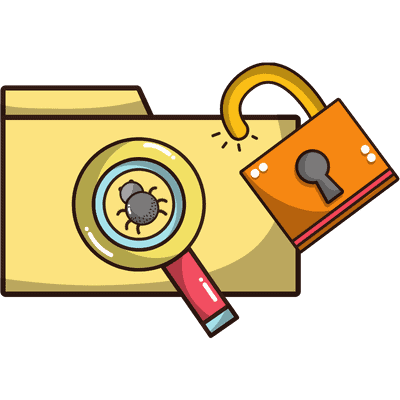
Data Privacy Settings
Configuring the privacy settings on your dating apps is also necessary for maintaining your security. Here are some steps you can take to verify you’re getting the most protection available:
Reviewing and Adjusting App Permissions
- App Permissions: Regularly review the permissions granted to your dating apps. These permissions can include access to your contacts, location, camera, and microphone. Limit these permissions to only what is necessary for the app to function.
- Privacy Policies: Familiarize yourself with the app’s privacy policies to understand how your data is being used and stored. This knowledge can help you make informed decisions about the information you share on the app.
Opting Out of Data Sharing and Tracking Features
- Data Sharing: Some dating apps share user data with third-party companies for advertising and analytics purposes. Opt out of these data-sharing options whenever possible to limit the exposure of your personal information.
- Tracking Features: Disable tracking features that monitor your location or online activity. Many apps offer options to turn off location tracking or limit it to when the app is in use. This can help prevent unauthorized access to your whereabouts.
By taking control of your app settings and permissions, you can better safeguard your personal data and cut way back on the risk of it being exploited by malicious actors.
Safe Online Dating Practices
Online dating is a fantastic way to meet new people, but it also comes with risks. To protect yourself, it’s important to recognize red flags and stay on your six. By knowing what some signs of suspicious behavior are and being cautious, you can enjoy online dating safely.

Recognizing Red Flags
Identifying warning signs early can save you from potential scams, harmful situations, and outright heartbreak. Here are the most common red flags to watch out for:
- Inconsistent Stories: If your match’s stories don’t add up, it’s a major warning sign. Pay attention to details and timelines in their stories. If they constantly change their narratives or give you a lot of conflicting information, they might be hiding something.
- Reluctance to Have a Video Call: Scammers often avoid video calls because they can’t match their real appearance to the photos they use. If someone continually makes excuses to avoid video chatting, it’s a sign they might not be who they claim to be. Genuine matches should be willing to connect face-to-face virtually at some point.
- Reluctance to Meet in Person: Similar to avoiding video calls, a reluctance to meet in person, despite reasonable circumstances, can indicate a scam. Real relationships typically progress to in-person meetings, and continual excuses can be a red flag of deceit.
- Requests for Money or Gifts: One of the most glaring red flags is a request for money or expensive gifts. Scammers often fabricate emergencies or sob stories to elicit financial help. Never send money to someone you have only met online, no matter how convincing their story may be.

Staying Vigilant
Maintaining continuous awareness and caution is key to safe online dating. Here are some steps you can take to help you stay secure!
- Regularly Updating Passwords: Change your passwords regularly and use strong, unique passwords for your dating profiles. This greatly reduces the risk of your accounts being hacked. Consider using a password manager to keep track of your passwords securely.
- Monitoring for Unusual Activity on Accounts: Keep an eye on your online dating accounts for any unusual activity, such as messages you didn’t send or profile changes you didn’t make. If you notice anything suspicious, change your password STAT and contact the app’s support team.
Reporting Any Suspicious Behavior Immediately: If you encounter suspicious behavior or feel uncomfortable with a user, report them to the dating app. Most platforms have mechanisms to investigate and take action against suspicious accounts. Reporting helps protect not only yourself but also other users from potential scams.
Protecting Your Devices
Regular software updates are a simple yet effective way to protect your devices from cyber threats. Here’s why it’s so important and how to manage updates:

Importance of Regular Updates for Apps and Operating Systems
- Security Patches: Software updates often include patches that fix vulnerabilities identified by developers. These patches protect your device from malware, hacking attempts, and other cyber threats. Keeping your operating system and applications current provides the latest defenses against these threats.
- Improved Functionality: Updates can also improve the functionality of your apps and operating system, meaning a smoother and more secure user experience.

Enabling Automatic Updates
- Convenience and Security: Enabling automatic updates on your device guarantees you get the latest security patches and software improvements without having to check for updates manually. This convenience helps maintain continuous protection.
- How to Enable: Most operating systems and applications offer an option to enable automatic updates. Check your device settings and turn on automatic updates.

Keeping Dating Apps Up-to-Date
- App Store Notifications: Regularly check for updates in the app store for the dating apps you use. Developers frequently release updates to address security vulnerabilities and enhance app performance.
- Manual Checks: If automatic updates are not enabled, make it a habit to manually check for updates periodically. This verifies you are using the most secure version of the dating app.
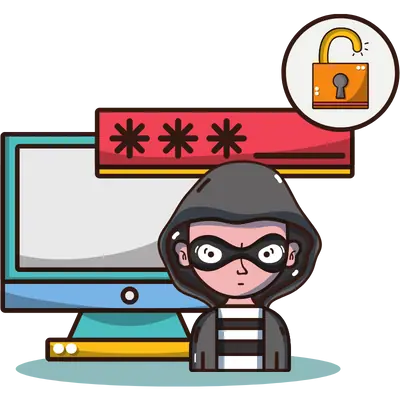
Using Antivirus and Security Software
Having reliable security software installed on your devices adds a bonus layer of protection against cyber threats. Here are the benefits and how to use these tools effectively:
Choosing Reputable Antivirus Programs
- Trusted Brands: Opt for well-known antivirus programs that are frequently updated to tackle new threats. Brands like Norton, McAfee, and Bitdefender are known for their comprehensive security features and regular updates.
- Comprehensive Protection: Look for antivirus software that offers comprehensive protection, including real-time scanning, malware detection, and phishing protection.
Regular Scans and Updates
- Scheduled Scans: Set up your antivirus software to run regular scans of your device. This helps detect and remove any potential threats that may have been missed during real-time protection.
- Updating Antivirus Software: Just like your operating system and apps, keep your antivirus software current to stay protected against the latest threats—enable automatic updates for your security software.

Secure Internet Connections
Using secure internet connections is crucial when accessing dating apps and websites when you are in a public space. Here’s how you can maintain a safe connection:
Avoiding Public Wi-Fi for Sensitive Activities
- Risks of Public Wi-Fi: Public Wi-Fi networks are usually unsecured, meaning it’s easier for cybercriminals to intercept your data. Steer clear of using public Wi-Fi for online dating and other sensitive activities where personal information is exchanged.
- Using Mobile Data: If you need to get your dating app on while on the go, consider using your mobile data instead of public Wi-Fi—mobile data connections are generally more secure!
Using VPNs for Additional Security
- What a VPN Is: A Virtual Private Network (VPN) encrypts your internet connection, making it difficult for cybercriminals to intercept your data. Using a VPN provides additional security when accessing dating apps and websites.
- Choosing a Reliable VPN: Select a reputable VPN service with strong encryption protocols and a no-logs policy. This verifies your online activities will stay private and secure.
Responding to Cybersecurity Incidents
Cybersecurity incidents are really scary and distressing, especially when they happen in the context of online dating! Knowing how to respond quickly and appropriately can mitigate potential damage and protect your personal information. Here are the immediate actions to take if you suspect a breach or scam and how to find recovery and support afterward.
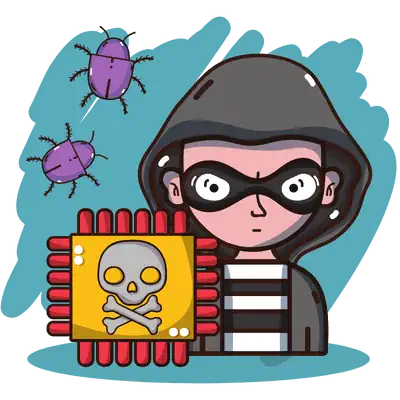
Immediate Actions
If you suspect that you have encountered a breach or scam, taking quick and decisive action is critical.
Stop Communication with the Suspect
- Immediate Cessation: Cease all communication with the individual you suspect of being involved in the scam. Do not respond to any further messages, and avoid providing any more personal information.
Report the Incident to the Dating App and Authorities
- Dating App: Report any suspicious activity to the dating app. All platforms have mechanisms for reporting abuse or scams, and they can take steps to investigate and potentially block the suspect’s account.
- Authorities: Report the incident to local law enforcement and, if applicable, to federal authorities such as the Federal Trade Commission (FTC) or the Internet Crime Complaint Center (IC3) in the United States. Providing detailed information about the scam can help authorities track down and stop cyber criminals.
Change Passwords and Secure Accounts
Update Passwords: Immediately change the passwords of your online accounts, particularly those that may share the same or similar credentials with your dating profile. Use strong, unique passwords for each account.
Enable Two-Factor Authentication: Activate two-factor authentication (2FA) on your accounts for more security—this makes it more difficult for unauthorized users to access your info.
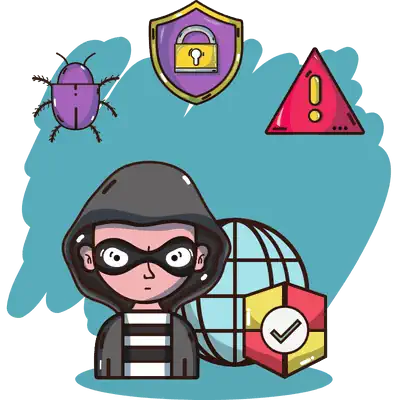
Recovery and Support
After addressing the immediate threat, it’s important to get support and take the necessary steps toward recovery:
Contacting Financial Institutions if Necessary
- Inform Your Bank: If you’ve shared financial information or suspect your financial accounts may be compromised, contact your bank or credit card company immediately. Explain the situation and follow their instructions for securing your accounts.
- Monitor Accounts: Keep a close eye on your financial statements for any unauthorized transactions and report them to your financial institution immediately.
Seeking Support from Cybersecurity Organizations and Online Communities
Cybersecurity Organizations: Reach out to organizations that provide support and resources for victims of cybercrime. Some well-known organizations include:
- Identity Theft Resource Center (ITRC): Offers free assistance to victims of identity theft and related crimes.
- Cybercrime Support Network (CSN): Provides resources and support for individuals and businesses impacted by cybercrime.
- National Cyber Security Alliance (NCSA): Provides tips and resources for staying safe online.
- Online Communities: Participate in online forums and support groups where you can share your experience and gain advice from others who have faced similar situations. Websites like Reddit have communities dedicated to cybersecurity and online scams where you can find support and information.
Conclusion
Cybersecurity is no joking matter—if you are online in any capacity, you have to take it seriously, and dating apps are no exception! If your head is spinning from all of the info above, here is a brief recap (a TL;DR) of all the points we discussed:

Common Cybersecurity Threats in Online Dating
- Phishing Scams: Fake emails or messages asking for personal details.
- Romance Scams: Fake profiles designed to build trust and then request financial help.
- Malware: Malicious links or attachments that can steal information or take control of your device.
- Identity Theft: Using personal information from profiles for fraudulent activities.
- Data Breaches: Exposing sensitive user information due to hacking.

Impact of Cybersecurity Breaches
- Financial Loss: Significant monetary losses due to scams.
- Privacy Invasion: Unauthorized access to personal accounts and misuse of information.
- Emotional Distress: Psychological impact, including feelings of betrayal and anxiety.

Setting Up a Secure Dating Profile
Choosing a Strong Password:
- Use a mix of letters, numbers, and symbols.
- Avoid easily guessable information.
- Consider using a password manager.
Profile Information:
- Share general interests, but avoid sensitive details.
- Use nicknames or first names only.
- Be cautious with social media links.
- Regularly update privacy settings.
- Use the platform’s messaging system for communication.

Secure Communication Practices on Dating Apps
- In-App Messaging vs. External Communication:
- Better security and controlled environment within the app.
- Maintain anonymity and privacy.
Risks of Moving to External Platforms Too Soon:
- Increased vulnerability to scams.
- Exposure to phishing and malware.

Avoiding Phishing Attempts
- Recognize unsolicited messages, urgency, and requests for personal information.
- Verify the source and report suspicious messages.
- Enable security features like two-factor authentication.

Verifying Matches and Maintaining Privacy
Verifying Identities:
- Conduct reverse image searches.
- Have video chats before meeting in person.
- Check social media profiles for consistency.
- Use services like Social Catfish for verification.
Using Privacy Features:
- Utilize incognito modes and profile verification tools.
- Block and report suspicious accounts.

Protecting Personal Data
Avoid Sharing Sensitive Information:
- Do not share phone numbers, addresses, or financial details.
Be Cautious About What You Share in Conversations:
- Limit personal details and avoid sensitive topics.

Data Privacy Settings
- Regularly review and adjust app permissions.
- Opt out of data sharing and tracking features.

Safe Online Dating Practices
Recognizing Red Flags:
- Be alert to inconsistent stories, reluctance for video calls, and requests for money.
Staying Vigilant:
- Regularly update passwords.
- Monitor accounts for unusual activity.
- Report suspicious behavior immediately.

Protecting Your Devices
- Keeping Software Updated
- Enable automatic updates.
- Regularly check for app updates.
- Using Antivirus and Security Software:
- Choose reputable antivirus programs.
- Schedule regular scans and updates.
Secure Internet Connections:
- Avoid public Wi-Fi for sensitive activities.
- Use VPNs for additional security.
- Responding to Cybersecurity Incidents.

Immediate Actions
- Stop communication with the suspect.
- Report the incident to the dating app and authorities.
- Change passwords and secure accounts.

Recovery and Support
- Contact financial institutions if necessary.
- Get support from cybersecurity organizations and online communities.
Taking proactive steps to protect your cybersecurity can greatly reduce risks while using online dating apps. By staying informed, cautious, and prepped, you can enjoy the benefits of meeting new people online without compromising your safety. Your online security is in your hands, and by following these guidelines, you can create a safer and more positive online dating experience!
We would love for you to share your own experiences and any additional cybersecurity tips with us and other readers! By contributing your knowledge, you can actually make a difference in creating a safer and more knowledgeable online dating community. Stay on top of cybersecurity practices to protect yourself and others, and let’s help everyone so they can have a safe and secure online dating adventure.
